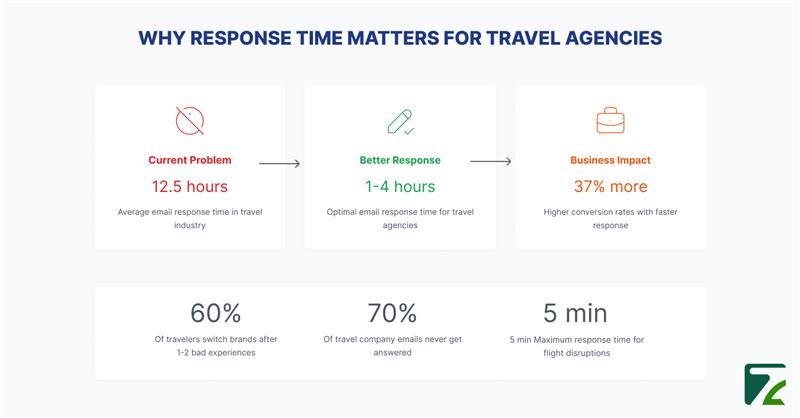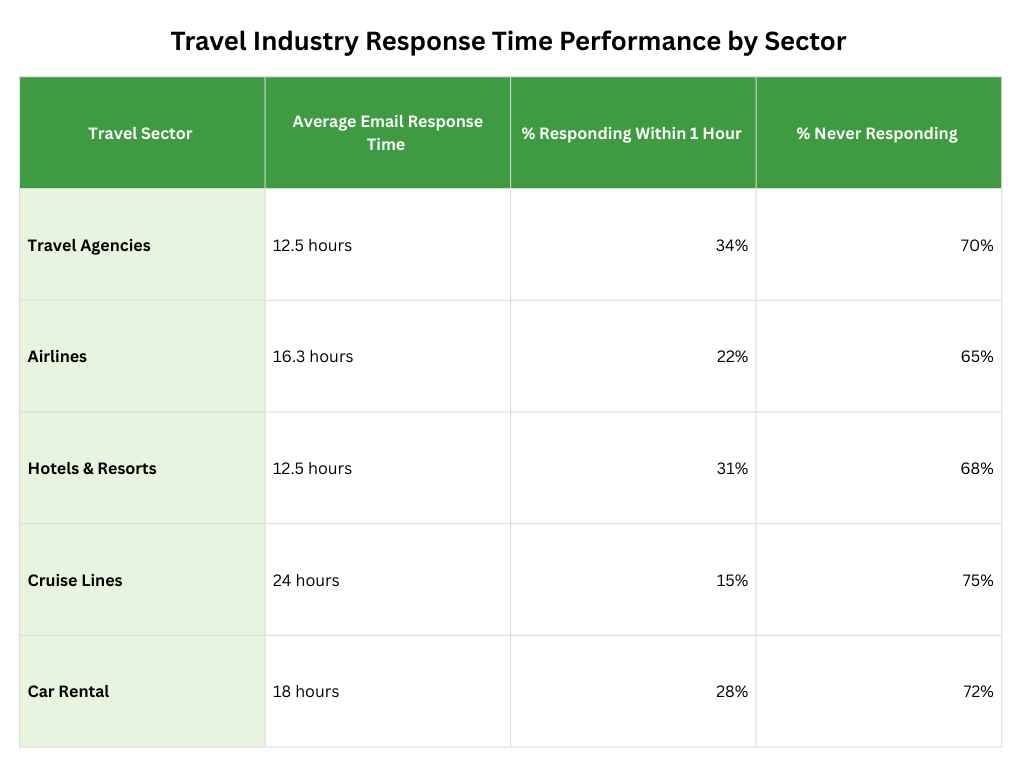When a traveler sends your agency an email at 2 PM asking to change their Barcelona flight that leaves tomorrow morning, how fast you react may be the difference in keeping or losing that client to a competitor forever. The story of this is repeated thousands and thousands of times daily at travel agencies around the world, and the numbers tell a story about what is really at risk.
Travel response time is the amount of time it takes for a customer to hear back from your team for the first time after they’ve submitted a question. In other industries not fast enough replies offer an inconvenience, for travel you want to live in the world of definite departure dates, limited seat availability and time sensitive pricing where every hour can mean a completely different price for you.
The travel sector has quite a harsh reality, with travel agencies having the lowest average email response time, around 12.5 hours, followed by airlines, at an average of 16.3 hours, and cruises just under 24 hours. But customer expectations are a whole other story. According to a survey of 90% of customers, an immediate response is considered “very important” when they have a customer service question; and that means within 10 minutes or less.
This expectation versus realization void presents a challenge as well as an opportunity for any travel agency that is ready to make speed of responsiveness a differentiator.
Response time measurement begins once a user sends their first message and ends when they have received a meaningful response from your team. Automated replies (i.e.. chatbots) shouldn’t qualify as response time (although they should guard your true times (by replying quickly) to your customers and keep them in the know).
For travel agencies, the time of response mostly matters during working hours. Say a customer sent an email at 11:00 pm on a Sunday but office hours were not until 9:00 am on Monday and a reply wasn’t sent until 10:00 am, the time to reply to that customer would be 1 hour not 10 hours.
This business-hours-only computation reflects the fact that travel agencies, unlike airline operations centers, generally aren’t staffed 24 hours a day. Still, the most competitive agencies are working extended hours or installing automated systems to cover evenings and nights.
The travel sector needs response time goals to be directly tailored to its business needs, and those business needs are not the same as general customer service standards:
Hotel Booking Requests: Conversion rates are 62% higher when replies are within the first hour. Travel industry email is at 36 hours; best performing agencies are at 1-4 hours.
Flight and Airline Support: Less than 1 minute for chat and 20 seconds for phone. Airlines dealing with disruptions cannot afford rollbacks of 5 minutes.
Vacation Rental Platforms: Average reply time is 8 minutes, for the highest conversion rate you need to reply in less than 5 minutes, or else 50% of reservations will be abandoned.
Travel Disruption Management: In the event of crisis, you need response times of seconds to five minutes for delays, cancellations and weather disruptions.

Fast response times produce tangible financial results that can justify technology investments:
Immediate Revenue Impact: Failed to answer, $57 in hypothetical income being left on the table for travel businesses. Companies responding in the first two hours have 37% better conversion rates and 24% better ADR.
Booking Conversion Rates: Travel Agencies achieve 62% higher conversion when replies are received in less than 60 minutes reportedly outshine competitors with average response times.
Customer Acquisition vs. Retention: Quick reply prevents booking abandonment and competitors switching, which is 5x more expensive to remove from customers than to keep them staying with good services.
Lifetime Value Protection: Customer support quality is the primary factor for 60% of travelers when selecting which brand to book with, and response time plays a part in customer lifetime value.
60% of consumers say they will change their travel brand preference after as little as 1-2 bad service experiences. Slow response times are one of the leading customer service failure reasons that motivate travelers to go to your competition.
The connection between response time and customer satisfaction is significant in travel especially because the industry is naturally time sensitive. A slow response regarding a flight change can mean rebooking at a reasonable fare, and getting another trip at premium, last-minute prices. This could lead to 52% of consumers stop buying from your brand due to slow response times.
Travel companies that regularly respond fast will be known and trusted beyond any single booking. These agencies enjoy the “network effect” of more word-of-mouth referrals and higher lifetime value from customers returning for future trips.
A quick response time typically reflects efficient internal systems that can help the agencies more than just in the area of customer satisfaction. And because 80% of companies say that self-service shortens response time, it appears that the more an agency does to improve their systems, the more payback time they’re likely to benefit from regarding their public.
Teams with a shorter time to response generally have:
Recent industry studies reveal significant performance variations across travel sectors:

These findings present a huge incentive for travel agencies to take advantage of systematic response time enhancements. Just answering all the questions, the least you can do, lands an agency the 30% for performance in the industry.
The average SPI (Social Support Performance Index) measuring response by personalization, empathetic and relevant response, acknowledgement of a message (Automated) and Resolution time is 50.88 (on 100).
The best social media travel companies are…
Yet, 55% of companies don’t have a presence on Twitter, 38% of companies don’t offer email support which is also quite alarming that not so much participate in a channel which customers use and expect to be offered.
The biggest travel companies with over 5,000 employees takes more than an 27 hours on average over the email for a response, but they are responding to social within 5.8 hours showing that their investment in social media tools is higher than in email systems.
Travel agencies have distinct challenges around response time for disruptions that’s nothing like it in any other sector. Flight delays, bad weather cancellations, and international events such as wars lead to time-critical scenarios for which immediate communication is needed.
Crisis Response Standards:
Proactively managing disruptions in the travel industry is among best practice at large travel agencies:
Intelligent Real-Time Alert Systems: Check flight conditions, weather, and events around the world, and notify your travelers before they talk to support.
Pre-Scripted Response Plans Predetermined responses to routine disruptions speed up response time from minutes to seconds.
TimeZone Management International travelers expect 24/7 support and will not settle for response time targets based on regular working hours.
Mass Communication Tools When there is a catastrophe that involves large numbers of travelers, agencies must have the ability to communicate with multiple travelers all at one time in a matter of minutes, not hours.
Innovative travel agencies are using AI to their advantage and getting response times down to seconds. Enterprises who have implemented AI solutions are achieving a return of $3.50 for each dollar invested, and in some cases even higher 8x returns.
Some of the AI solutions especially useful for travel agencies are:
Routine Inquiry Chatbots: Get answers for common questions in relation to baggage allowances, check-in and about destinations instantly, which will give you extra time for addressing complex issues by human agents.
Automated Triage Systems: Route incoming inquiries based on a combination of urgency and complexity and escalate vital concerns such as flight changes to available agents right away.
Response template suggestions: AI reads through customer queries and recommends suitable response templates to save agents having to type emails out from scratch.
Travelist, a Polish travel reservation site, was growing fast and the demand affected their customer support. They juggle multiple inboxes, overlapping email threads, and support messages that fell between shifts. Customer requests were falling through the cracks, response times were spotty, and the team had no sense for what their workload looked like.
Travelist adopted Hiver’s shared inbox with internal SLAs and easy-to-track responsibility. They could see exactly who and which inquiries were being handled, the priorities serving as the order of importance, and the response progress.
This change illustrates how systematic reduction in response times automatically leads to efficient operation and satisfied customers in travel agencies.
91% of buyers would use a knowledge base if it had the information they needed. The response time is getting shorter right away for travel agencies with full-featured self-help as customers get their own answers.
Good travel agency knowledge bases cover information about visas, requirements, baggage rules and policies, travel insurance, booking processes, and destination details.
Leverage SLAs (Service Level Agreements) to get the high-priority tickets attended to faster. Travel agencies should set varying response time promises to inquiries based on urgency as follows:
Critical Issues (flight cancellations, medical emergency): 15-30 minutes
Urgent Issues (departure within 48 hours, payment problems): 2-4 hours
General Query / Upcoming Appointments: 6-12 hours
Marketing Inquiry / Feedback: 24-48 hours
Teach your customer service reps to make replies sound personal from the first one. Standard replies are quick but more often than that causes more back and forth and increases time to close.
Effective training focuses on:
A single dashboard provides you with a 360-degree view of all your metrics so you can monitor and uncover anomalies, trends, and patterns.
Some of the metrics that travel agencies need to be monitoring are:
Response time to travel support has gone from a nice-to-have feature of a service to a business critical measure, on which revenue, retention and competitive position depend. 60% of consumers will change hotels and go for another brand after only a small number of poor customer service events has made response time more important than ever before.
The data indicates potential for travel agencies that are prepared to invest in response time enhancements. Given that 70% of emails and 46% of social messages go unanswered, staying in touch separates agencies from the competition.
In 2025 and beyond, the most successful travel agencies will be the ones that view response time as a strategic differentiator, not just an after-thought. Through the effective application of technology, training and processes, agencies can turn their response operations from a cost center into a profit center that supports scalable business growth.
The issue for travel agencies is not whether they should focus on improving their response time, but how soon they can change to bring them on a par, or better with their competitors? And in an industry where timing is everything, the fastest among the agencies that do respond will survive.
Response time is the duration between when a traveler raises a query and when they receive a meaningful reply from the agency.
Because travel involves time-sensitive bookings quick replies prevent cancellations, booking losses, and customer defection.
Travel agencies average 12.5 hours, airlines 16.3 hours, and cruise lines nearly 24 hours, far slower than customer expectations.
By using cloud systems, AI for routine queries, shared inboxes, automation, and extended support hours with trained staff.
Faster replies boost conversions, protect customer loyalty, and increase lifetime value, while delays often drive travelers to competitors.

Travel Automation Expert